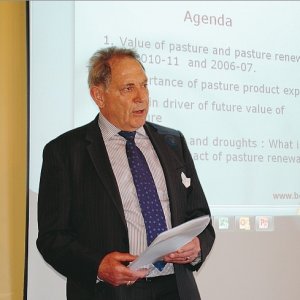He is often asked whether New Zealand’s relatively strong agricultural export prices in recent years are temporary, he told a recent seminar.
Some economists worry whether China’s growth rate is dropping from, for instance, 8% to 7.5%, but this is minor compared to the overall trend, he says.
“I don’t think the last few years are just a bubble. I think we will continue to have strong growth.”
He had earlier told the seminar his figures showed New Zealand farmgate returns had increased 58% in the past four years, with dairy strongly leading the way – worth $11.6 billion in the year to September 11, which was 72% of all farmgate value.
But New Zealand’s terms of trade or ratio of export prices to import prices did trend down for decades, he says. Explaining terms of trade, he says people think of it as a dollar figure – the surplus of our exports less our imports – but it actually was the price relationship.
The easiest way to understand it, he says is, for instance, how many kilos of milk powder (or other commodities) it takes to buy so many imported shoes, tractors or cars.
“And that trended down for decades and we were told New Zealand would always have declining terms of trade because we are a commodity exporter, and manufacturing exports always have that inflation cost plus… the cars, the tractors, the shoes were always going to get more expensive.”
Sanderson says from 1950 to 1985 the export prices compared to import prices did drop but about the mid-1980s this started to turn around – and has carried on.
“There’s a fundamental reason: since the mid-1980s Asia has industrialised.”
Many Asian people previously were not in the cash economy, they were subsistence farmers and their food cost nothing. “That was probably one of the reasons our commodity prices were going down. But now those people are shifting into the industrialised cities, or some of the family are, and once they shift away from the subsistence farms they’ve got to be fed with purchased food products.
“In those factories they are producing the cars, the tractors and the shoes a lot cheaper than they were in Europe and North America – the countries we used to buy from.
“So essentially we’ve got two good things going our way: we’ve got people who are producing cheaper goods on the manufacturing side – they can sell them significantly cheaper than Europe and North America; and they need to be fed.
“This is a fundamental change and the trend therefore is long term,” he says, not just for China but India and other Asian countries.
Food commodity prices would fluctuate but every time they went down they came up, and “seemed to come up a little bit more”.
“So my conclusion, very strongly, is this is a structural change.”















